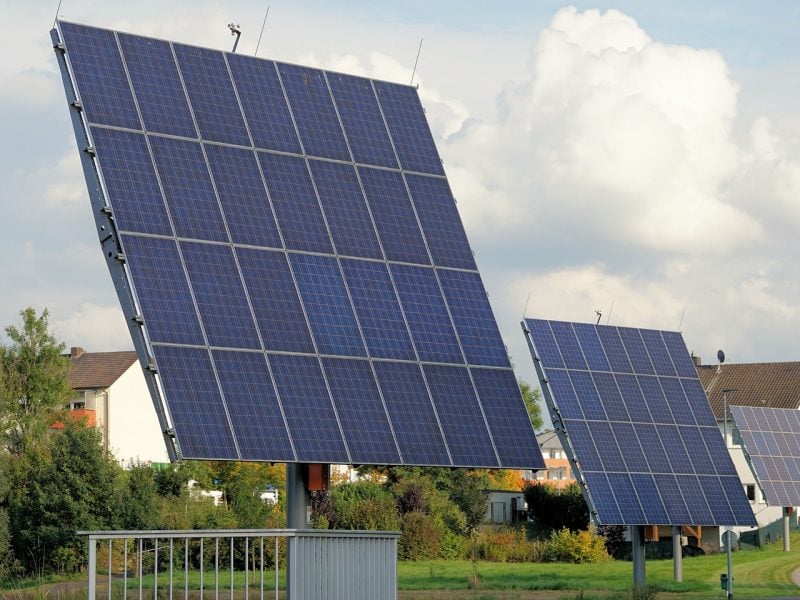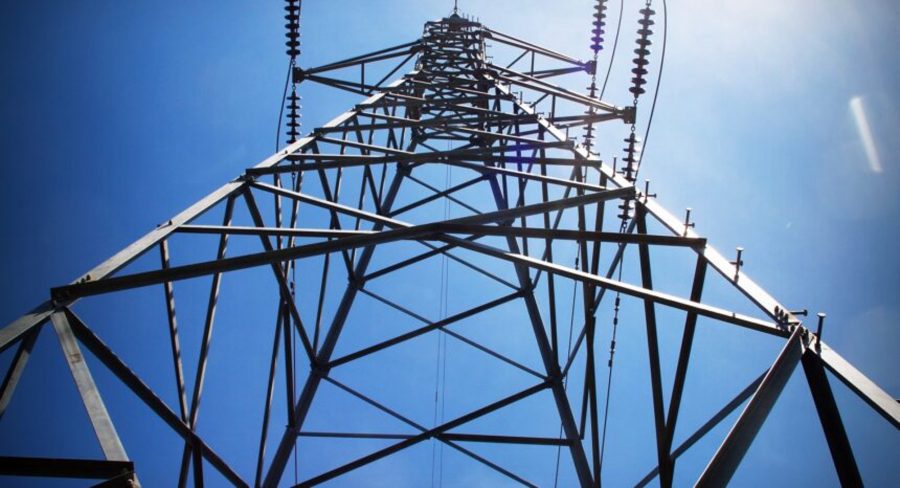“It’s an unstable system, but we’re bringing stability to it,” so confirmed Glen E. Archer, Teaching Professor of Electrical and Computer Engineering at Michigan Technological University. While making this statement, Archer is standing in EERC 134, or the Smart Grid Operations Center. In this sophisticated classroom, students attack such topics as interoperability, energy management and emergency control, and system protection; as well as monitoring the connections into MTU’s Energy Management System and the regional grid. And so, so much more. It is, from my starry-eyed perspective, a very cool room.
At this point, the Michigan Tech Global Campus team has been touring the Electrical Engineering Resources Center (EERC) and picking Archer’s brain for the last hour. This room is the last stop on our educational tour.
As he speaks, my attention is divided between the brilliant, glowing grid on the wall and the energy and experience of Archer. He clearly has a passion for the important work and research that transpires in MTU’s electrical engineering classrooms and laboratories. And even more of a passion for electrical power engineering itself.
Which brings me, once again, to his earlier comment. He had mentioned that power engineering jobs might not seem particularly trendy, but those employed in this field have very important work to do. And much of this work is done behind the scenes. “Maybe the humble, unsung heroes of the engineering world,” I suggested. He didn’t comment, but smiled.
Power Engineers: Working Wherever the World Needs Them
Electric power engineering, a subfield of electrical engineering, is dedicated to all things electric power: from its generation, transmission, distribution, conversion, utilization, and management. The electrical apparatus and components associated with these systems, both large and small (wiring, cables, circuit breakers, fuses, switches, converters, vehicle drives, and so on), also fall under power engineering. Depending on their specialty and educational pathway, electric power engineers may work with electric power systems, power stations, solar voltaic cells, wind turbines, and electrical grids.
Electric power engineering may also go by other names, such as power engineering, power system engineering, power management, and power systems management. Its engineers are found wherever people and organizations need power, energy storage, renewables, and intermittent power sources.
Some Electric Power Engineering Workplaces
- Utility companies
- Manufacturing plants
- Engineering Firms
- Infrastructure related to the oil and gas industry
- Other industries
- Airports
- Hospitals
- Residential complexes
- Schools

Filling a Shortage of Electric Power Engineers
Although they may not outwardly seem flashy, careers in electric power engineering have the advantage of being both flexible and mobile. Or to put it another way, the knowledge and competencies that power engineers acquire on one job may be transferred to another. This versatility means significant career choice and mobility, both within and between organizations as well as in workplaces throughout the world.
That is, as more countries transition to renewable energy sources and advanced technologies and invest in more infrastructure, the global demand for electric power engineers will likely increase. Some experts even believe that there is a definite shortage right now.
According to a summary of the Global Energy Talent Index Report, “power companies everywhere are struggling to balance talent shortages with changing skills.” The writers continue to say that there is a “looming skills shortage of engineers in the power, nuclear, and renewables sectors.”
What does this shortage look like? The GETI document confirms that as many as 48% of power professionals are concerned about an upcoming skills crisis whereas 32% believe the crisis has already hit the sector. 28% contend that their company has been affected by a skills shortage.
There are three main causes of this crisis: massive retirements, an aging workforce that requires upskilling, and a need for more workers with training in new power electric technologies. The report states that 13% of power workers are 55 years and older whereas 17% are between 45 and 54.
Confronting Upcoming Challenges
In short, both United States and the world need power engineers to not only fill these gaps but also address present and upcoming challenges.
In this nation, one of the biggest issues facing American engineers is contending with an outdated American grid in need of both repair and replacement. This aging grid can cause reliability problems, power shortages, and other complications. However, electric power engineers face other challenges, which affect the United States and beyond.
Improving Energy Storage

Increasing the capacity and efficiency of energy storage systems is one key concern. To enable the widespread adoption of renewable energy sources, electric power engineers must develop better and more cost-effective energy storage solutions.
There is a need to improve the performance and efficiency of battery technology, which is essential for the large-scale energy storage. The excess electricity generated by renewable sources can then be used to help meet peak demand or provide back-up power during outages.
Increasing Grid Reliability
As electric grids integrate with more renewable sources (such as wind and power), power engineers must ensure grid stability and reliability. They must also develop solutions for reducing grid congestion. And create strategies for maintaining system stability and resilience in the face of climate change, extreme weather events, cyber-attacks, and other potential threats.
In fact, right here at Michigan Tech, Dr. Chee-Wooi Ten (Electrical and Computer Engineering), has spearheaded an impressive, interdisciplinary research team since 2010. This group contains members from the fields of statistics, business, engineering, and computer science. Its goals are advancing power engineering and developing strategies for improving power grid cybersecurity, grid reliability, interdependence, and sustainability.
Integrating Smart Technologies
Smart technologies are helping to make electricity consumption more efficient. For instance, smart meters allow utility companies to track and measure electricity consumption in real-time. They also enable consumers to monitor and adjust their own energy usage. Automated demand response systems can also reduce or increase electricity consumption according to fluctuations in the grid. And then there are advanced distribution management systems for utility companies to monitor and manage their electric grid in real-time. These can detect outages, schedule maintenance, and react to changing electricity demand.
There is a need for power engineers to understand these technologies and develop ways to integrate new smart systems into the existing grid. These strategies might include implementing communication protocols, creating intelligent control systems, and developing cybersecurity policies.
Ensuring Cybersecurity
Cyberattacks on the grid are not just the stuff of movies. For instance, in 2022, Russian cyber-hackers targeted Ukraine’s power grid. And in 2016, hackers chose a Florida power utility as their mark. The result: pumps ran continuously, causing not only waste but also physical damage. And since 2018, the US has been fending off Russian cyber-attacks on critical infrastructure.
Cyberattacks on electrical grids, then, can cause major disruptions and blackouts. It is obvious that one of the responsibilities of power engineers is improving the cybersecurity of the grid. This task is also one of the main objectives of Dr. Chee-Wooi Ten’s CIResilience team.
Addressing Environmental Concerns
Power plants, especially coal-fired ones, generate substantial emissions. And the cooling and operation of these plants require sizeable amounts of water. In fact, the power sector is the largest industrial power user. Therefore, a main engineering challenge is lessening the environmental impact of electric power systems, including reducing emissions and water consumption, improving efficiency, and minimizing waste.
Pursuing Electric Power Engineering at Michigan Tech
In short, as the world’s population continues to grow, the demand for electricity will increase significantly. Additionally, global citizens are requesting more sustainable and environmentally friendly energy infrastructure. Engineers may answer these calls by developing renewable energy sources and technologies as well as reducing electricity consumption and improving power efficiency.
If you’re up for these (and other) challenges, Michigan Tech offers several educational routes in electrical power engineering. For instance, there is a 13-credit undergraduate certificate in Electric Power Engineering and a 15-credit Graduate Certificate in Advanced Electric Power Engineering. Both of these certificates have been designed with consultation from experts from electric utilities and industry. In other words, students receive the knowledge, skills, and aptitudes that working electric power professionals regularly apply in their careers.
And, of course, there is the 30-credit MS in Electrical and Computer Engineering, with a Focus in Power Systems.
Whatever your preferred educational or career path in power engineering, Michigan Tech can help you get started.
